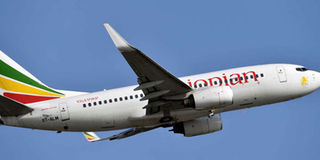Bankelele: When Ethiopian Airlines relocated to Nairobi

An Ethiopian Airlines plane.
What you need to know:
- At a time of turmoil and uncertainty, the management of Ethiopian Airlines did not take any chances.
I recently read a fascinating book titled “Successfully Implementing Turnaround Strategies in State-Owned Companies” that looked at the fortunes of three airlines: South African Airways, Kenya Airways and Ethiopian Airlines, now the largest carrier in Africa.
In it, there's a curious incident involving Ethiopian Airlines that happened 30 years ago and which shows the resilience and quick decision-making strategy of the airline's management.
In May 1991, the year then Ethiopian leader Mengistu Haile Mariam was overthrown, he went to the airport. He told his staff he was going to visit a recruitment camp at a small town where troops were training to repulse forces that were marching towards Addis Ababa.
But his Buffalo plane landed in Kenya where he refused to disembark until Ethiopia's ambassador in Nairobi came to the aircraft. After realising he had been overthrown, he later flew to exile in Zimbabwe where he had sent his family several months before.
As news of his departure came through, over the next few days, embassies like France and Italy chartered planes for Western staff to exit before Addis fell. Peace talks mediated by the United States were set for London as rebels circled the city and rejected offers by the makeshift government that came in after Mengistu.
Tsefaye Dinka, the Prime Minister, withdrew from the peace talks overseen by US envoy Herman Cohen after the American government called for rebels to enter Addis Ababa to stabilise the situation.
The young Ethiopian People's Revolutionary Democratic Front (EPRDF) soldiers were considered disciplined and friendly and their spokesman said they would preserve key installations and prevent looting. They had not interfered with the country's two main outside lines, the airport in Addis and the Djibouti railway line. Even as their soldiers gaped at the opulence they found at Addis Hilton Hotel, nothing was taken away.
But the management of Ethiopian Airlines was not taking chances. On a single day, 14 planes from Addis landed in Nairobi. The news coverage at the time focussed on which senior military and government officers might have been on two military planes, but a dozen were Ethiopian Airlines aircraft with civilians.
An airline official said evacuation of the planes was a deliberate effort to salvage them from imminent shutdown in Addis Ababa, and would resume operations in a week from Nairobi in June 1991. Flights that had left Addis for various destinations returned to Nairobi after completing their journeys.
Then Kenyan Minister for Transport and Communications, Joseph Kamotho, said there was a mutual agreement with Ethiopia that allowed the airline to operate from Kenya.
Kamotho ruled out fears that the arrangement would affect Kenya Airways' operations or cause congestion at the Jomo Kenyatta International Airport (JKIA), which he said had the infrastructure to handle additional air traffic.
In an exclusive interview with the Nation, the airline's president Captain Zeleke Demissie said they had senior managers, maintenance engineers, crew and marketing teams available as personnel were booked into several Nairobi hotels including the Nairobi Safari Club, New Stanley, Six Eighty and The Ambassedeur.
Zeleke said Ethiopian would ply international routes using 10 wide-body planes at Nairobi. He thanked then President Daniel Moi, Kenya Airways, the Civil Aviation Board and all Kenyans for receiving them at this crucial time. Things were already clearing and Zeleke expected that they would move back to Addis within a week.
Other than resilient management, the book shows that what sets Ethiopian Airlines apart is quick independent decision-making, investment in capacity and maintaining low-cost operations.
As Ethiopia grapples with another political crisis, we wish the country the best and hope we will not have a repeat of the 1991 situation.




